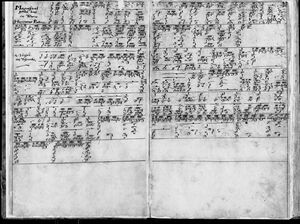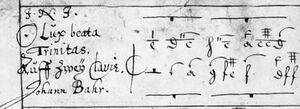Visby Tablature: Difference between revisions
Fiskfan1999 (talk | contribs) split johann bahr |
Fiskfan1999 (talk | contribs) add new link |
||
| Line 19: | Line 19: | ||
== Reference == | == Reference == | ||
[[Jeffery T. Kite-Powell|Kite-Powell, Jeffery T.]] (editor). ''The Visby (Petri) Organ Tablature: Investigation and Critical Edition.'' Wilhelmshaven: Heinrichschofen's Verlag, 1979. | [[Jeffery T. Kite-Powell|Kite-Powell, Jeffery T.]] (editor). ''The Visby (Petri) Organ Tablature: Investigation and Critical Edition.'' Wilhelmshaven: Heinrichschofen's Verlag, 1979. | ||
[https://sok.riksarkivet.se/arkiv/gyqHzRbuYnDirmntWnHU45 sok.riksarkivet.se], accessed 15 August, 2023. | |||
A complete scan of the tablature is available at [https://sok.riksarkivet.se/bildvisning/J0000003_00001 sok.riksarkivet.se], mirrored {{IMSLP|839399}} | A complete scan of the tablature is available at [https://sok.riksarkivet.se/bildvisning/J0000003_00001 sok.riksarkivet.se], mirrored {{IMSLP|839399}} | ||
Revision as of 18:20, 15 August 2023
S-VIl SE/ViLA/20021/H/3 (also known as the Visby Tablature or Orgeltabulatur Petri-Bahr) is an organ manuscript held in the Riksarkivet Landsarkivet i Visby, containing organ works by Hieronymus and Jakob Praetorius, Johann Bahr, and several anonymous pieces.
Description

Almost all of the pieces in the tablature were written by Berendt Petri while he was studying under Jakob Praetorius. The copies were likely made from assorted loose leaves, which may have been mixed up (some evidence for this is that part of a Chorale Fantasia Ach Gott vom Himmel siehe darein which appears in the middle of a verse of the Magnificat septimi toni)[1].
The pieces written by both copyists are in New German Tablature Notation. Some pieces have a stylized f at the end of a multi-verse work signyfing "finis" (for an unknown reason, this symbol also appears at the end of the third verse of the five-verse setting of the Magnificat septimi toni).

Johann Bahr
At a later point, Johann Bahr became the owner of the manuscript. During this time he wrote four of his own compositions (including the only two vocal cantatas in the manuscript) in some (but not all) of the remaining blank pages. These pieces are in a lighter hand, and two of them are dated 1655 and 1666. These are the only four pieces by Bahr which survive to the modern day.
Anonymous Pieces
The tablature contains many pieces with no composer attribution, all multi-verse chorale settings which were likely meant for Alternatum use. Professor Kite-Powell attributed all of these pieces to Hieronymus Praetorius on stylistic grounds, such as similarities in motivic fragments and diminutions to the attributed Magnificats. These attributions are generally accepted now and these pieces are included in the complete organ works edited by Klaus Beckmann[1].
Contents
The Kite-Powell edition contains a complete transcription of the tablature into stave notation (including the vocal cantatas by Bahr).
Reference
Kite-Powell, Jeffery T. (editor). The Visby (Petri) Organ Tablature: Investigation and Critical Edition. Wilhelmshaven: Heinrichschofen's Verlag, 1979.
sok.riksarkivet.se, accessed 15 August, 2023.
A complete scan of the tablature is available at sok.riksarkivet.se, mirrored IMSLP839399